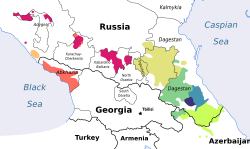| Tukita | |
|---|---|
| Tokita[1], Tokitin[2] | |
| Тукитинский диалект | |
| Native to | North Caucasus |
| Region | Southern Dagestan |
| Ethnicity | Karata |
Native speakers | 1,500[3] |
| Cyrillic | |
| Language codes | |
| ISO 639-3 | – |
kpt-tok | |
| Glottolog | toki1238 |
The Tukita dialect is a dialect of the Karata language, common in the villages of Tukita in the Akhvakhsky District and Tukita in the Khasavyurtovsky District of the Republic of Dagestan.[4] It has significant differences in phonetics, morphology and vocabulary with the proper Karata dialect.
Linguistic characteristics
[edit]There are noticeable differences in the vocabulary (For example, Tukita "гьерса", Karata "лълъерсса", Russian "река", English "river", as well as Tukita "гьангъу", Karata "гьанда", Russian "холм, курган", English "hill, mound").[5]
In the Tuktitan dialect, the formation of numerals is vegisimal (two-decimal), in contrast to decimal (ten-decimal) in Karatin proper. In cardinal numerals, the particle "-да" is absent (Tukita "кlекlи", Karata "кlеда", Russian "два", English "two"). The formation of the names of tens is also different.[6]
There are differences in pronominal adverbs (Tukita "гьуди", Karata "вудугу", Russian "там (вдали, по горизонтали)", English "there (far away, horizontally)").[7]
The formant of the dative case in the Tukita dialect is "отцу", which coincides with the Akhvakh language ("иму лъа" — "отцу" - "to the father").[8]
The weak ejective lateral afrikata [кьl] is absent. Tukita has a dorsal spirant [г], which is a variant of Karatin [хь]. The spirant [хь] itself is significantly palatalized. The palatalized consonants [г], [к], [кь] are represented.[9]
In the dialect, the affixes of personal pronouns and the vowel of the stem change ("мен" - "ты" - you, "мини" - "тебя" - "you").[7]
The dialect is influenced by the Avar language.[7]
References
[edit]- ^ "Tokita". Glottolog. Retrieved 7 September 2025.
- ^ "Karata". LINGUIST List. Archived from the original on 20 December 2016. Retrieved 7 September 2025.
- ^ "Тукитинский язык — родныеязыки.рф" (in Russian). Archived from the original on 2021-10-23. Retrieved 2025-09-08.
- ^ "Тукитинский язык | Малые языки России". minlang.iling-ran.ru (in Russian). Archived from the original on 2021-10-23. Retrieved 2025-09-08.
- ^ "Географическая терминология в аварской топонимии". cyberleninka.ru (in Russian). Archived from the original on 2021-10-20. Retrieved 2025-09-08.
- ^ "Сивухский говор в системе диалектов аваро-андо-цезской группы дагестанских языков". cyberleninka.ru (in Russian). Archived from the original on 2021-10-18. Retrieved 2025-09-08.
- ^ a b c "Особенности дейктической системы каратинского языка". cyberleninka.ru. Archived from the original on 2021-10-20. Retrieved 2021-10-20.
- ^ "Форманты дательного падежа в ахвахском и каратинском языках". cyberleninka.ru (in Russian). Archived from the original on 2021-10-22. Retrieved 2025-09-08.
- ^ "Сивухский говор в системе диалектов аваро-андо-цезской группы дагестанских языков". cyberleninka.ru (in Russian). Archived from the original on 2021-10-18. Retrieved 2025-09-08.

